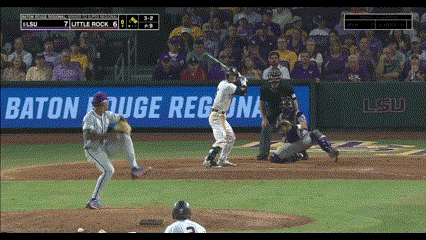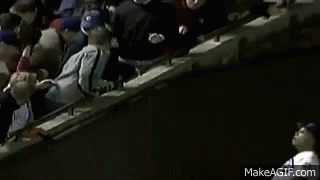Umpire's Big Strikeout Blunder on Little Rock & The Power of Vibes
Little Rock baseball's Cinderella run ended on a questionable strikeout call. It's all part of the inexplicable mysticism of sports.
A thrilling Regional-round weekend in the college baseball postseason concluded with the most unlikely of upsets thwarted, as perennial powerhouse LSU escaped with a 10-6 comeback win over Little Rock. The way in which the Tigers advanced past this year’s most improbable underdog leaves much to be desired, though, and left me pondering everything from Steve Bartman to the legacy of Moneyball vs. the role Vibes play in sports.
Little Rock — which landed in the NCAA Tournament after a Cinderella run through the Ohio Valley Conference Tournament — pounded Rhode Island in Baton Rouge Regional play, 22-10; stunned nationally ranked Dallas Baptist, 8-6; then knocked off the 2023 College World Series champion, Regional hosts, and No. 6 overall seed LSU, 10-4, to set up Monday’s winner-take-all rematch for a spot in the Super Regional.
Coming into the postseason (and, despite winning three games there, leaving the postseason) with a sub-.500 record, Little Rock’s three-week journey to even force a do-or-die finale with the Tigers is among the calendar year’s most remarkable sports stories. 2025, particularly in college sports, has produced some postseason duds between the slog that was the expanded College Football Playoff and an edition of men’s March Madness desperately lacking in its typical underdog magic1.
While the Super Regionals are made up almost entirely of Big Four conference representatives, upstarts bounced Regional hosts across the bracket: Utah Valley and Cal Poly combined to oust Oregon without the Ducks winning so much as a game in Eugene; UTSA stunned Texas in Austin en route to the Roadrunners advancing; and No. 1 overall seed Vanderbilt bowed out to Wright State in the most shocking result of the tournament.
Had Little Rock held on to oust LSU, however, the Trojans would have carried that distinction. Hell, a Little Rock win would perhaps supplant Fairleigh Dickinson’s 2023 NCAA Tournament defeat of Purdue as the quintessential postseason upset of my time following sports.
Had LSU joined nine of its Southeastern Conference peers exiting the NCAA Tournament after the Regional round, I’m also left to wonder if professional chazer and Chief Executive Bellyacher Greg Sankey would have demanded the rest of the postseason be cancelled. If nothing else, maybe the SEC commissioner will demand the 2026 postseason be made up of 64 SEC bids. They can figure out the math on that later.
No need for Sankey and Co. to shut down the College World Series just yet, though. LSU won and hosts West Virginia in the Super Regional, while Little Rock goes home. The better team by any objective measurement won.
But then again, if “the better team” by most (or even all) metrics always won, would any of us care at all about sports? If outcomes could be determined in advance via spreadsheet, we could have saved a lot of time handing the Los Angeles Dodgers a second straight World Series championship back in December when they were putting together a roster plenty of folks genuinely pondered might be the best ever.
Likewise, the past seven weeks of NBA Playoffs could have been skipped to get us to a Celtics-Lakers Finals. After all, Los Angeles trading for Luka Doncic to pair him with LeBron James should have tipped the West in its favor. And no way the reigning champion in Boston could exit the Playoffs before at least the Eastern Conference Finals, right?
That’s not to suggest “the better team” doesn’t often or usually win. But there’s enough instances to the contrary to keep things exciting for us as spectators — and it happens enough to support the thesis that sometimes, Vibes beat metrics.
Vibes go by many different names: Mojo. Juju. Energy. Culture. The label is immaterial, as any descriptor conveys the same underlining principle of an intangible, unquantifiable dynamic. You can’t see it or measure it, but you can damn sure feel it.
Maybe it’s cringey to tout the existence of such cosmic forces some 20 years after the book Moneyball popularized statistical analysis. My sportswriting salad days came during the blogosphere’s first generation at a time when fledgling content creators — before “content creator” existed in the lexicon — often took inspiration from some combination of Bill Simmons, the original incarnation of Sports by Brooks2, and Moneyball3.
The latter influence manifested in everyone from recent J-school grads with a .blogspot.com address to sitcom writers and novelists moonlighting under pseudonyms deriding anything that couldn’t be explained in cold, hard numbers as coming from sports journalism’s Dark Ages.
And, indeed, our collective understanding of statistical analysis has revolutionized essentially every team sport. But in 30’ish years of following sports, including 20 in some professional capacity, I’ve also collected enough data points to declare pretty definitively that, yes, Vibes can impact outcomes.
There’s no guaranteed formula for manufacturing Vibes; they blossom organically. Vibes can also be positive or negative. Little Rock’s Regional appearance embodies both ends of the spectrum.
Trojans coach Chris Curry touched on it in his postgame press conference following Little Rock’s massive upset of No. 20-ranked Dallas Baptist, a budding NCAA Tournament fixture with 14 postseason appearances since 2008 and two Super Regional trips.
“I was thinking in the ninth inning how we were percentage points away from not making our conference tournament,” Curry said. “Then we get in the tournament, get hot.”
Baseball’s a funny game. Of the three major team sports in the United States, it’s the best fit for rigid statistical models to determine outcomes. The turn-based structure is less chaotic then the constant back-and-forth of basketball, and it lacks the physicality of football.
At the same time, baseball produces more bewildering anomalies. Curry cited the very-much Vibes-based concept of getting hot, and to that end, what can one attribute to Angel Cano, a .247 hitter for the season, producing four straight multiple-hit games with home runs in three of the Baton Rouge Regional?
Curry spoke of pitcher Gage Haley during the coach’s press conference and an almost otherworldly sounding plan to start the Mississippi State transfer vs. DBU.
Said Curry: “I went to bed last night knowing that Gage was going to start. I did not want to tell him, but I did text his parents …[to] make sure that they would be here. [I get on the elevator on floor No. 5 and there was a big 6'6" pitcher standing in front of me; can't make it up.
“I said, ‘Gage, how's your morning going?’ He smiled, said, ‘Good, Coach.’ I said, ‘Good, you're starting today.’ [Haley responded], ‘Oh, okay.’”
Haley, who finished the season with a 7.71 ERA and started only twice previously, executed the job Curry tabbed him to complete.
Said Haley: “Our offense since the conference tournament started has been on fire, so I knew that if I just ate up innings, threw a lot of strikes, let the defense work and let them play behind me, I knew that my offense would score runs. And that was the mindset going into there.”
Vibes shifted at a certain point against LSU, however. While no one can manufacture Vibes, you can pinpoint moments when they surface for the good or the bad. And in the Regional finale, the strikeout captured at the top of this newsletter is one such moment.
LSU had taken the lead after Little Rock initially led 5-1, so perhaps the Tigers win was inevitable at that point. Maybe. But baseball’s best examined when blending mysticism with math — the two need not be mutually exclusively. And referring to this Runs Expectancy Matrix, a team’s expected run-scoring rate in MLB is 1.23 with the bases loaded and one out.
With runners on first and second and two outs, which happened as a result of the consequential strikeout called against Little Rock, the rate plummets to 0.31 runs.
Judging a strike zone on TV is difficult in part because of camera angles and the lack of full depth perception. Even so, I’m not sure what camera angle makes this pitch appear any less off the plate and inside.
Kudos to Tigers catcher Luis Hernandez, however. His framing is, to borrow a phrase from Johnny Sack, more creative than Spielberg.
The punchout killed the Little Rock rally, and in turn, delivered a devastating Vibes Shift. Introducing another concept sure to make some readers cringe — Momentum — Momentum is an element of Vibes. It’s essentially what Curry described as getting hot, and it can shift in an instant.
LSU’s three runs in the top of the ninth, immediately following Little Rock’s unfortunate end to the bottom of the eighth, was a Vibes Shift approaching the magnitude of Steve Bartman’s interference in the 2003 NLCS.
Did Steve Bartman give up eight runs? Absolutely not. Bartman also didn’t cost the Cubs in Game 7. But is Bartman’s infamous foul ball moment one of, if not the chief reason I believe in the power of momentum and the role Vibes play in sports still to this day?
100%. And when Zach Henry was called out to snuff the Little Rock rally, preceding a three-run LSU ninth, I added another entry to my Vibes database.
The umpire’s role in Little Rock falling short of the Super Regional opens up another topic that has been debated to death: Why not replace umpires and referees with mechanical instruments that can render judgements without human error?
As a firm believer in the power of the unpredictable and intangible in sports, I’m vehemently against that. The way in which Little Rock lost might be disappointing, but imperfections contribute to the overall beauty of sports.
Maybe it’s tinfoil hat’ish of me, but I believe March Madness’ lack of Cinderella runs this year was by design.
2022-23 College Basketball Epilogue, Part 3: The Death of St. Francis Brooklyn
At the beginning of the 2022-23 college basketball season, four programs that qualified for NCAA Tournament participant since the event’s inception in 1939 never made the field. By March, that unfortunately exclusive club was whittled down to three, but not because one of the four finally broke through.
That is to say, post photos of scantily clad models and wait for the site visits to roll in.
The film came later, but I nevertheless feel obligated to include the adaptation’s trailer. Still, whether you’re discussing Moneyball the book or Moneyball the film seemingly has to be clearly stated upfront in much the same way fans of Friday Night Lights the book, movie or TV series distinguish. A side note relevant to this conversation is that the author of the original book, Buzz Bissinger, rather famously unloaded on one of the more prolific early-blogosphere pundits, Will Leitch.
It was HBO Sports’ most profane segment until a year later when Artie Lange asked Joe Buck if “SuckingC*ck dot com” was the broadcaster’s second-favorite website.







The impact of intangibles in a game or series...interesting stuff, Kyle. Btw, I saw the Cardinals play Vandy last month in the Ville and wasn't feeling the Commodores. It was just one game but must've been the intangibles.